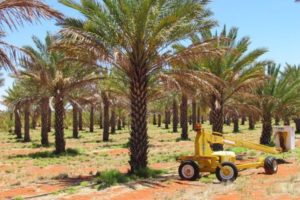Technology of Date Palms For Food and Feeding Industry

The principal objective of the paper is to assess the quality of the technical knowledge of date farmers regarding date palm production technologies. The process of assessing quality using empirical methods was applied to a sample of 120 date palm farmers in Dera Ghazi Khan (abadpur province, eastern India). An initial visit by an expert consultant was followed by six interviews with rural inhabitants, representing a representative sample of villagers and farmers from three geographically and economically diverse locations in the region.
Date palm production has become serious an important business in India. Dera Ghazi Khan, located in the district of Bardhaman, has been selected as the location for the main study village. Dera Ghazi is located on the outskirts of the town of Bardhaman. To facilitate the collection of sufficient quantitative data on date palm production technologies, this paper describes the village selection process and various interviews conducted in the context.
Selection of the selected areas was based on the availability and quality of basic infrastructures. These were generally available in all selected areas. In addition, the presence and size of local markets and skilled labor were also taken into account. It should be noted that most of the rural populations depend largely on informal sector for agricultural and household goods production. Farmers in these areas may have some knowledge of agricultural productivity development and are capable of implementing quality processes of production. This is especially true of the semi-skilled and skilled labors such as tillers, fertilizers, seed sellers, seedling cutters, etc.
The process of selection of villages was carried out according to the characteristics of the localities. The locations were selected from the periphery of major urban centers. The process of selection of the places continued with the consideration of the soil types in the selected areas, the socio-economic conditions of the people in the selected communities, and accessibility of necessary infrastructural facilities. In other words, the selection was targeted at meeting the developmental objectives and constraints of the communities in terms of location.
The process of cultivating date palms was initiated in the 1980s. The main objective was to increase the production capacity of the farmers to meet increased demand for agricultural products. In fact, the objective was to produce premium date fruits in specified quantities in specified locations. The premium dates are renowned for their superior taste and quality. The objective was to introduce improved quality, quantity and service. Production technology of date palms was undertaken to increase the productivity of the farmers involved in production.
The success of the efforts to improve date palm production has led to a situation when it is widely used as a cash crop by various households across the world. The value of the crops produced from such plantation is appreciably high, due to its rich taste and quality. The major advantages of palm cultivation are better pest control, lower labour cost and better quality of the end products. The palm is known for its exceptional pest management capabilities.
Date Palm production has significantly improved due to better use of technology. The improved date palm production has lead to higher market values of the end products including its resale value and its value as agricultural land. Palm is a good choice for the development of chemical free fertilizer because its resorcinol content makes the fertilizer quite effective in improving the pest management and controlling the fungus diseases that occur in plants. The resorcinol content of the fertilizer acts as an insecticide that significantly reduces the growth of pathogenic microorganisms.
There is a significant scope of potential future income in the palm and food chain for developing countries due to date palms’ adaptability and productivity. In fact, there are numerous projects in Malaysia, Australia, China and Africa currently underway to develop date palm plantations and related agricultural sectors with the desired outcome of increased agricultural production and incomes. These projects are focused on the diversification of the agricultural produce industries, improved pest control methods and other related activities to support the sustainable development of date plantations.